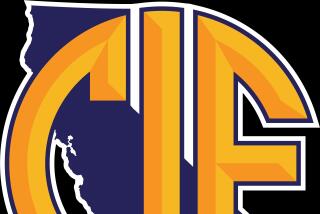Phelps Backs Stronger Academic Requirements
- Share via
CHICAGO — Notre Dame basketball coach Digger Phelps is a staunch believer in curing a situation early before it turns into a serious problem.
He does that on the court, calling a time out before an opposing team can get a leg up on his Fighting Irish.
But he also believes the same philosphy can be applied toward the problems of academic standards and eligibility in college sports today.
Phelps does enjoy a high profile through his achievements with the Irish and the constant national exposure the school receives.
But he has been outspoken in calling for tougher educational standards in the nation’s high schools, increased corporate and governmental financing to pay teacher salaries and for more discipline on the part of coaches to watch over their student-athletes.
Phelps would like to see the entire educational system strengthened, not just to ensure that no recruiting violations take place but to guarantee better educated young people in the country.
“I think the strength of any nation is in its schools and we should do whatever we can to upgrade what is being taught in high schools so that when these student-athletes come to us they are better prepared,” Phelps says.
By improving standards on the high school level, not only will student-athletes be better prepared for colleges but will have a better chance to survive in university life.
“I think all of it is a problem in society and what is needed is community commitment to make sure that we have solid educational backgrounds for high school students attempting to come into college,” Phelps says.
Phelps saw as steps in the right direction the methods used in some Texas high schools to require student-athletes to pass courses before they can play in extracurricular sports or in California where a 2.0 minimum grade point average is needed.
“You take a look at discipline curriculum and what they did in Texas and in California is definitely the right way to go,” Phelps says. “I think we saw many more high school students ineligible because of these standards and this woke up a lot of people there and around the nation.”
At the heart of any problem, according to Phelps, is money. Money that is allegedly paid to student-athletes, money going to universities from athletic successes but also money paid to the people who teach the students. He believes the government and private sectors must help universities to fund education to attract top quality coaches, and teachers.
“I think state lotteries are a good idea for funding but I also think the corporate sector has to take a leading role each year,” he says.
If money is not paid to attract teachers on all levels, students will come into college unprepared. Some won’t even be able to read, or write.
“No wonder a John (Hot Rod) Williams comes to his booking and can’t even read his rights,” Phelps says. “That should be enough to wake up some people as to what has to be done.”
The NCAA has addressed itself to upgrading standards for incoming student-athletes by requiring a minimum of 700 on the Scholastic Aptitude Test scores. It is a proposal that has been severely criticized as being unfair.
But Phelps would like to see the measure taken one step farther to guarantee better academic standards in high school.
“I think the 700 is too low. It should be higher,” Phelps says. “The only way you can guarantee that teeth will be in any regulation is by taking away someone’s eligibility. If you do that, then you’ll see better enforcement, better standards and a push to guarantee people are prepared for college.”
The key to improving the educational system and the requirements for student athletes doesn’t necessarily rest with the college coaches. Phelps says the key is at the very top with university and college presidents.
“The momentum has begun with the various propositions,” Phelps says. “University presidents cannot be soft now, they have to keep pushing.”
However, college coaches cannot escape either the responsibility, or the blame, if a student-athlete develops trouble either in the classroom, on the court or outside of the university campus.
“I’m really shocked at the mentality of some of the coaches today,” Phelps says. “Would they take such an inactive role if it was their own son?”
Phelps says the issue is no longer racially oriented. It is something that society must address itself to, and address itself to immediately.
More to Read
Get our high school sports newsletter
Prep Rally is devoted to the SoCal high school sports experience, bringing you scores, stories and a behind-the-scenes look at what makes prep sports so popular.
You may occasionally receive promotional content from the Los Angeles Times.






